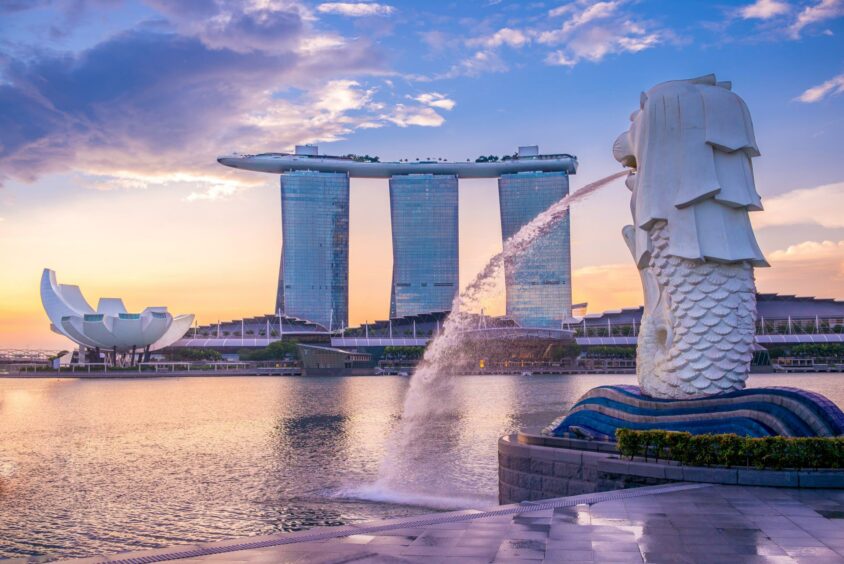
Singapore plans to develop hydrogen as a pathway to accelerate transitions to net zero emissions and strengthen the Southeast Asian nation’s energy security.
Low-carbon hydrogen, including its derivatives such as ammonia, has emerged as a key potential pathway for Singapore and could supply up to half of the country’s power needs by 2050, Deputy Prime Minister and Minister for Finance, Lawrence Wong, said in a speech today at Singapore International Energy Week (SIEW).
“Hydrogen has the potential to be adopted across different sectors as a low-carbon fuel or feedstock. Hydrogen does not release any greenhouse gases when combusted. When produced through low emission methods such as through the electrolysis of water using renewable energy, it can have close to zero emissions,” said Wong.
“For Singapore, hydrogen can complement and diversify our power mix alongside solar, imported electricity, and other potential low-carbon energy sources such as geothermal energy. Depending on technological developments and the development of other energy sources, hydrogen could supply up to half of our power needs by 2050. It can also play an important role in decarbonising our industry,” he noted.
“Besides domestic emissions, low-carbon hydrogen and hydrogen-derived fuels are potential alternatives to fossil fuels in the maritime and aviation sectors. As the busiest container trans-shipment port and one of the leading air hubs in the world, Singapore can be a catalyst for the global transition towards greener shipping and aviation,” he added.
Advancing Singapore’s hydrogen journey
“Many hydrogen technologies are still under development, and a global supply chain has yet to be established. Nevertheless, there has been strong interest internationally from the public and private sectors to accelerate the development of hydrogen across the value chain, as evidenced by a growing pipeline of production projects worldwide, as well as active industry and research efforts into hydrogen technologies,” said Wong.
Singapore will take steps to prepare for hydrogen deployment domestically and work with partners to build a hydrogen supply chain in Asia. There are five key thrusts.
“First, we will experiment with the use of advanced hydrogen technologies that are on the cusp of commercial readiness. In this regard, we will launch an Expression of Interest for a small-scale commercial project on utilising ammonia for power generation, including developing ammonia supply chains to also support marine bunkering needs. Such a project will allow us to assess the viability of ammonia – as both a hydrogen carrier and as a direct fuel – and develop regulations and ecosystem to support it. Further details will be released in the coming months,” Wong told delegates.
“Second, we will conduct research and development work to advance these hydrogen technologies. Hydrogen will be a key focal area for Phase 2 of the Low Carbon Energy Research (LCER) Programme. In October 2021, we awarded $55 million for projects under Phase 1 of the programme for research into low-carbon technologies. A further $129 million will be set aside for Phase 2. Through collaborations between academia and industry, we aim to unlock key technological bottlenecks so that Singapore is able to import, handle and utilise low-carbon hydrogen and its derivatives safely and at scale,” he said.
“Third, the Government will work closely with industry and international partners to enable the formation and scaling up of supply chains for low-carbon hydrogen. This will include advancing the development of Guarantee of Origin certification methodologies, ensuring that methodologies are interoperable across jurisdictions, and building a trading and financing ecosystem to facilitate global trade of low-carbon hydrogen,” added Wong.
“Fourth, the mass deployment of hydrogen will require new infrastructure to import, store and transform the hydrogen into power. We will develop the land and infrastructure plans and pace its implementation accordingly,” he noted.
“Fifth, the adoption of hydrogen will bring about new economic opportunities for Singapore and our enterprises and workers. Opportunities abound along the hydrogen supply chain – financing, trading, certifying, transporting, storage and deployment. We will work with industry and the education sector to support workforce training. This will put Singaporeans in good stead to capture new opportunities in the global hydrogen economy,” he concluded.
